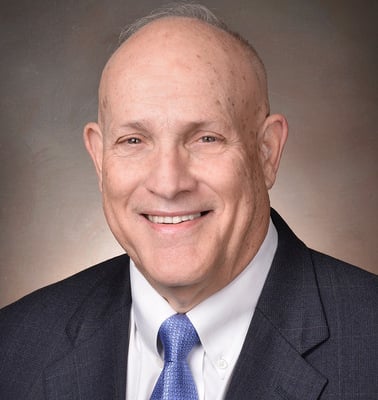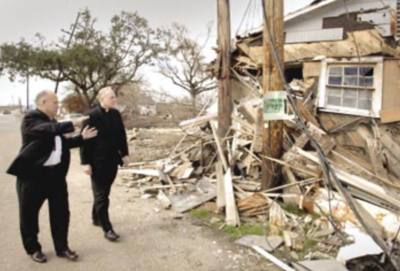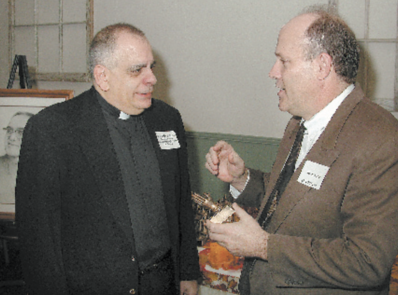
A platform that encourages healthy conversation, spiritual support, growth and fellowship

NOLACatholic Parenting Podcast
A natural progression of our weekly column in the Clarion Herald and blog

The best in Catholic news and inspiration - wherever you are!
Costanza appointed bishops' advocate with lawmakers
-

By Peter Finney Jr.
Clarion HeraldNot one to draw attention to himself, Tom Costanza has toiled quietly in the Catholic trenches for the last 34 years in evolving roles as a counselor and later as a social services program and office director, jobs that always seemed to fit seamlessly with his focus on Catholic Social Teaching and on improving the daily lives of those who needed a “hand up” instead of a handout.
Now, Costanza will be working in a much more public role as the new executive director of the Louisiana Conference of Catholic Bishops (LCCB), the body that works with state lawmakers to explain and advocate for the public policy positions of Louisiana’s seven Catholic bishops.
Archbishop has 'deep respect'“I’ve known Tom for many years and have a deep respect for him,” Archbishop Gregory Aymond said April 6 in appointing Costanza to succeed Rob Tasman, who had served as executive director of the LCCB for the last 12 years. “Tom not only knows well the teachings of the church but also can apply them in very practical situations. I have no doubt that his discussions with legislators will be informative.
“He also has an ability to listen to people with other points of view. I have great confidence that he will help move us forward on many issues, but especially in examining bills that are presented to the Legislature.”
S
 ince 2002, Costanza has served as a key executive with Catholic Charities Archdiocese of New Orleans, directing the Office of Justice and Peace from 2002-15 and then serving since 2015 as a division director. He also played pivotal roles in emergency response and case management after Hurricanes Katrina and Rita in 2005, the BP oil spill in 2010 and Tropical Storm Isaac in 2012.
ince 2002, Costanza has served as a key executive with Catholic Charities Archdiocese of New Orleans, directing the Office of Justice and Peace from 2002-15 and then serving since 2015 as a division director. He also played pivotal roles in emergency response and case management after Hurricanes Katrina and Rita in 2005, the BP oil spill in 2010 and Tropical Storm Isaac in 2012.
From 1996-2002, Costanza was director of program development for the archdiocesan Social Apostolate, helping implement goals for the six neighborhood centers that offered direct services to the poor. The Social Apostolate merged with Catholic Charities in 2002.Costanza has master’s degrees in business administration from Loyola University New Orleans, in social work from Tulane University and in theological studies from Notre Dame Seminary. He attended Notre Dame Seminary for 3 1/2 years but did not go on to ordination.
Mix of theology and practical skills
 Costanza hopes that his mix of theological and academic training and his experience dealing directly with the needy through the lens of the Catholic faith will pay dividends in his new role working with legislators.
Costanza hopes that his mix of theological and academic training and his experience dealing directly with the needy through the lens of the Catholic faith will pay dividends in his new role working with legislators.“I think with all my years on the programming side of things I’ll maybe be able to add some value in understanding that dimension as well,” Costanza said.
While Costanza has worked closely with a few public officials, especially after natural disasters, he realizes his new role will be to explain why the church takes certain public positions on bills that are being discussed. The new, two-month legislative session begins April 12.
Costanza said in the U.S. bishops’ document on Catholics’ responsibility to engage in the public square, he was struck by a quote from Pope Francis, who said people underestimate the “value” of politicians.
“He said it could be a higher form of social charity if you follow the principles of the common good,” Costanza said. “It’s almost like Pope Francis was saying, ‘Wait a minute, these politicians could really have a high impact with the idea that we’re trying to improve society.’ If we follow these core principles of Catholic Social Teaching, only good can come out of it.”
The seven bishops who oversee the state’s dioceses will meet April 28 to discuss any bills on which they might want to express a public opinion.
“They will look at all the bills and determine that this is the slate of issues we think are relevant to the Catholic Church,” Costanza said. “Schools and school funding issues are always big.”
Costanza said he hopes his low-key demeanor will work well with lawmakers, who get tugged from many sides when they are deliberating a bill.
“I have to do all my dialogue with love and try to engage them, and, at the same time, be resolute about our church’s teaching,” Costanza said. “We have such a rich tradition of social teaching and we have so much to bring to the public square. It’s faith and reason.”
Costanza, who will continue to reside in New Orleans while living in Baton Rouge during the legislative sessions, said the Catholic Church’s history of dealing with members of other faith traditions, particularly after the natural disasters, has created a foundation of goodwill among lawmakers.
“We were across all religions and all denominations for the sense of the common good and of the human person,” Costana said. “Relationships are built across all the different faiths and people, knowing we have a common goal. We all have a fundamental belief in the dignity of the human person. Our common denominator is how valuable life is.”
The LCCB also works with the bishops to produce occasional policy statements and coordinates shared projects among all seven dioceses.




